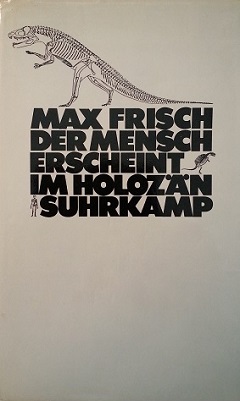In my search for books that could be considered “climate literature” or “climate change narratives” I recently came across a volume by Swiss writer Max Frisch, entitled “Der Mensch erscheint im Holozän” (english edition titled “Man in the Holocene“). Frisch wrote the short novel in the 1970s and it saw several editions and reworkings until it was eventually published in it’s final version in 1978.
So this is way before the general climate change discourse got under way. For comparison: In 1971 Germany passed the first environmental protection law in the history of the country and in 1974 established a National Environmental Protection Agency, the first of it’s kind in Europe. People in the 1970s spoke about nature and weather, but not about climate. Even more interestingly, Max Frisch in 1974 intended to name the short novel “Climate”.
The final title which translates literally as “man appears in the Holocene” I find even more astonishing, as it seems to anticipate the now popular concept of a man-made geological epoch, the Anthropocene. Geologically speaking, man did not arrive in the Holocene but in the Pleistocene. By referring to the Holocene instead, the era of the present, Frisch cleverly plays with temporality: What appears like one of many quotes the protagonist of the story clips from his science books, can also be read as a description of an occurrence in the present: The protagonist appearing in his environment, in his epoch.
Here’s a short passage from the original German text:
— die Alpen sind durch Faltung entstanden.
— die Ameisen leben in einem Staat.
— das Gewölbe haben die Römer erfunden.
— wenn das Eis der Arktis schmilzt, so ist New York unter Wasser, desgleichen Europa, ausgenommen die Alpen.
— viele Kastanien haben den Krebs.
— Katastrophen kennt allein der Mensch, sofern er sie überlebt; die Natur kennt keine Katastrophen.
— der Mensch erscheint im Holozän.
What makes this short novel remarkable is not only Frisch’s political foresight, but rather how the author reflects on man’s place in the environment and how he connects scientific knowledge and the lived experience of the individual in a moment of – assumed or real – natural catastrophe. As the protagonist remarks above: “Man alone knows disasters – if he survives them. Nature knows no disasters.”
All of today’s skepticism towards the language and role of science is here, the profound uncertainty and ambivalence about the relationship between oneself and nature, the sense of existential loss, what we now call eco-anxiety, or “solastalgia” (Glenn Albrecht), and the all too real threat of extreme weather events. And yet it is all within a very simple story about an aged and lonely human being, a very humane and humble story.
I think it is not coincidence that this early environmentalist literature is from Switzerland and is set in the Swiss Alps. For centuries, Switzerland was among the poorest countries with the most hostile living conditions in all of Europe. Life in the valleys of Ticino was hard and there was constant threat of natural disasters and extreme weather events like rockslides, extreme cold or droughts. (for example see my post here) People in this region had to live – and still often do – in close connection with nature and develop intimate understanding of the forces around them. Frisch’s text can also be read as an account of this intimate and fragile relationship between the collective, the individual and the environment in the moment of it’s disintegration and collapse.
To me this is a beautiful example of how literature attempts to address issues of global and existential political magnitude in a human-sized and emotionally accessible and moving format. One of the most beautiful “climate narratives” I came across and I highly recommend reading it.
Note: Amitav Ghosh of course knew Max Frisch’s short novel when he wrote his famous non-fiction book “The Great Derangement: Climate Change and the Unthinkable”. He does reference Frisch, but does not quote his text. For obvious reason: In the following passage towards the beginning of the book Max Frisch pretty much formulated Goshs whole thesis 50 years prior:
“Romane eignen sich in diesen Tagen überhaupt nicht, da geht es um Menschen in ihrem Verhältnis zu sich und zu andern, um Väter und Mütter und Töchter beziehungsweise Söhne und Geliebte usw., um Seelen, hauptsächlich unglückliche, und um Gesellschaft usw., als sei das Gelände dafür gesichert, die Erde ein für allemal Erde, die Höhe des Meeresspiegels geregelt ein für allemal.”
My translation: Novels are not suitable at all these days; they are about people in their relationship to themselves and others, about fathers and mothers and daughters or sons and lovers, etc., about souls, mainly unhappy ones, and about society, etc., as if it were the terrain secured for it, the earth once and for all, the height of the sea level regulated once and for all.
